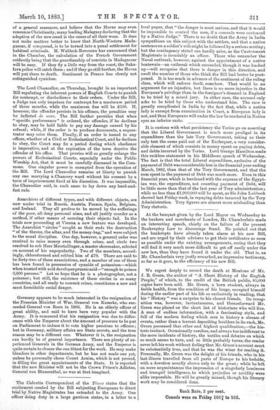The Lord Chancellor, on Thursday, brought in an important Bill
regulating the inherent powers of English Courts to punish for contempt, or disobedience to their orders. Under the Bill, a Judge can only imprison for contempt for a maximum period -of three months, while the maximum fine will be £500. If, however, the offender persists in his offence, the penalties may be inflicted de novo. The Bill further provides that when -" specific performance" is ordered, the offender, if he declines to obey, may be held liable to pay any damage caused by his refusal; while, if the order is to produce documents, a segues- trator may seize them. Finally, if an order is issued to any -offioer, whether of a Civil or Ecclesiastical Court, and he declines to obey, the Court may fix a period during which obedience is imperative, and at the expiration of the term deprive the -offender of his office. That proviso will so greatly enlarge the powers of Ecclesiastical Courts, especially under the Public Worship Act, that it must be carefully discussed in the Com- mons. One singular power is exempted from the operation of the Bill. The Lord Chancellor remains at liberty to punish any one marrying a Chancery ward without his consent by a term of imprisonment fixed at his discretion. It was impossible, the Chancellor said, in such cases to lay down any hard-and- fast rule.


































 Previous page
Previous page